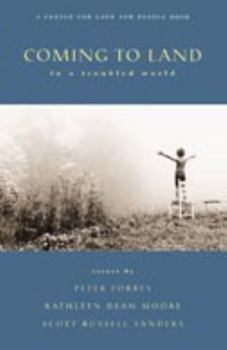Coming to Land: In a Troubled World
Select Format
Select Condition 
Book Overview
Gerald Middleton is a sixty-year-old self-proclaimed failure. Worse than that, he's "a failure with a conscience." As a young man, he was involved in an archaeological dig that turned up an obscene... This description may be from another edition of this product.
Format:Paperback
Language:English
ISBN:0967280699
ISBN13:9780967280691
Release Date:January 2004
Publisher:Center for Land and People Book, the Trust fo
Length:128 Pages
Weight:0.50 lbs.
Dimensions:0.4" x 5.5" x 8.1"
Customer Reviews
1 rating
A Conservationist's Manifesto
Published by Thriftbooks.com User , 20 years ago
COMING TO LAND is an amazingly rich book, capable of fostering profound personal and social transformation. In the first essay, "Landing," Kathleen Moore unearths and airs the profound disconnects of our culture: "We have been away for many centuries, we people of the western industrial nations. We have built a culture on the mistaken assumption that human beings are independent of one another and of the places and systems of the earth." To borrow from author Derrick Jensen, we are a culture of make believe; and the end result of the lies we tell ourselves and our children is economic and cultural alienation en mass. But Moore is not content with this revelation. She goes on to discuss several other "lies that isolate us" (the false dichotomies of today/tomorrow, near/far, us/them, and humans/nature) and then outlines the process of grief, denial, anger, bargaining, depression and acceptance of our ecological predicament. It is a very sobering essay that seeks "creative acts of commitment--acts of imagining and choosing." It is an essay about "caring for people and caring for places, (accepting) the challenge of reconciliation, bringing together what has been apart for a very long time." The second essay, "A Conservationist's Manifesto," is just that--a rich, stirring document about humanity's relationship with nature. Having begun as a lively talk between members of the Century for Land and People, it encapsulates the insight and wisdom of many individuals, including such environmental luminaries as William Cronon and Bill McKibben. Point 22 reads: "In order to live, we must use the earth--but we should not use it up. For the sake of our descendants, we must learn to grow food without depleting the soil, fish without exhausting the seas, draw energy from sunlight and wind and tides. We must conserve the minerals we mine and the products we manufacture, recycling them as thoroughly as the forest recycles twigs, leaves, fur, and bone." All together, it is truly inspiring document, promoting a mature and ethical relationship between humans and the environment; and would make for a wonderful educational tool. The third essay, "Lifting the Veil" by Peter Forbes, is actually six essays in one, and by far the longest and most eclectic of the bunch. Weaving in and out of such topics as time capsules, domestication, and the biographies of great people (Aldo Leopold, Scott and Helen Nearing, Thoreau, and Rachel Carson), Forbes articulates a new vision of conservationism. Differing from the old view, which simply seeks to preserve places, Forbes' vision seeks deep and lasting social change. Ever conscious of how it might end in less funding and social marginalization, he keeps his radical roots. In his words, "As much as conservation is succeeding in creating refugia, or safe havens for pockets of diverse life that might survive the industrial growth society, we conservationists are failing to take the risks necessary to help people life differently, to en




